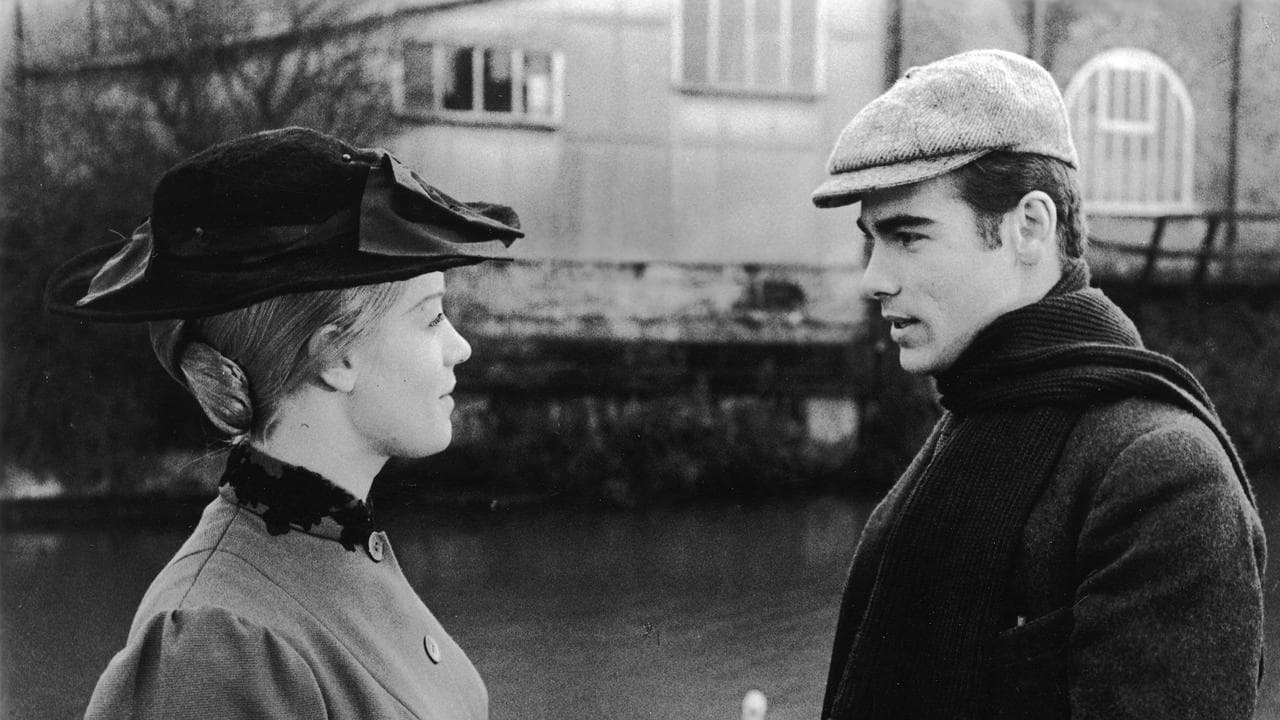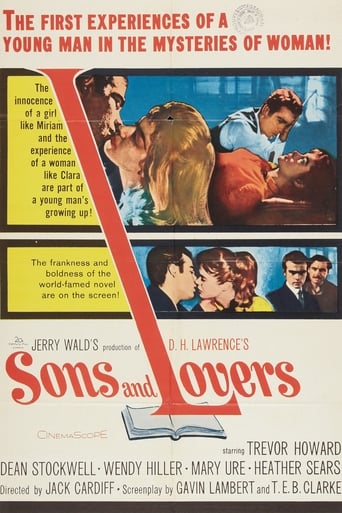

What makes it different from others?
... View MoreBad Acting and worse Bad Screenplay
... View MoreIn truth, there is barely enough story here to make a film.
... View MoreIt was OK. I don't see why everyone loves it so much. It wasn't very smart or deep or well-directed.
... View MoreThis film won several Oscar nominations in 1960 including Best Picture (Jerry Wald), Best Director (Jack Cardiff), Best Actor (Trevor Howard) and Best Supporting Actress (Mary Ure). It had a very good cast and one of those unforgettable movie theme songs. I'm not sure that it is possible to capture a large classic novel in a 90-min movie, but if it is, this one came close. Based on D.H. Lawrence's semi-autobiographical novel, this film captures some of the common themes displayed in his other works: the search for ideal love and sensuality and its limitations in the industrialized and modern life of early 20th Century England. Although written MUCH earlier than the 'kitchen sink realism' of the late 50s and early 60s, it still captures some of its flavor and uses the same geographical setting, the English Midlands. The protagonist of the story is Paul Morel (Dean Stockwell) who has an almost idyllic love for his mother, Gertrude (Wendy Hiller). He also hates his father, Walter (Trevor Howard), who—-though usually good natured--treats his mother beastly. Paul asks his mother how she can put up with his father's drinking. She answers by saying that he was once young and handsome and good.The relationship between Paul and his mother clearly points towards emotional insect. Gertrude wants to rescue her three sons' lives from the mine. With her eldest son now living in London and her youngest son being killed in a mine explosion, she turns her attention to Paul. And, even though both Paul and his mother know that their love for each other is only that between a mother and a son, Gertrude is clearly jealous of Paul's intimate closeness towards his long-time girlfriend, Miriam (Heather Sears, Room at the Top). Miriam's mother thwarts their relationship because she doesn't think Paul is good enough for her and seems to have forced a religious fanaticism on Miriam. Paul and Miriam's physical relationship seems destined to failure. After making love, Paul tells Miriam that she was sacrificing herself to him, and he wanted her to WANT more of him.When Paul makes love to Miriam, he is thinking of his mother. When Paul turns down an art scholarship in London and takes a job in a nearby corset factory, he does it to protect his mother and she doesn't protest that much. In the factory, he is attracted to one of his fellow worker, Clara Dawes (Mary Ure, Look Back in Anger). The married (but separated) Clara is a suffragette who seems very different from Miriam. After Clara and Paul go off for a weekend together, Paul is confronted, and beat up by, Clara's husband, Baxter (Conrad Phillips). After this, Clara breaks up with Paul, realizing that she will always own Baxter (or that he would always need her) and Paul only wanted the physical relationship. This is a GREAT MOVIE, FULL OF FEELING AND EMOTION, and with all of the principal cast members at their best.
... View MoreIn this fine adaptation of the Lawrence novel, the son of a coal-mining family aspires to become an artist. The only American in a British cast, not only does Stockwell flawlessly adopt an English accent, but he also turns in an excellent performance. This is certainly one of the high points of a career that has spanned a remarkable eight decades from the 1940s to the 2010s. Howard and Hiller play his parents and the latter is particularly good. Supplying the love interest are Ure and Sears, two actresses who both died too soon. After a long, distinguished career as a cinematographer, Cardiff scored his first directorial success with this drama.
... View MoreFreddie Francis's cinematography is in some ways the star. It is not showy or intrusive. It's totally organic to the unfolding of the plot. Yet it is exquisite -- both with landscapes and with actors. This is especially true with Trevor Howard, very powerful as a boozy miner.The other star is that great actress Wendy Hiller. Her role is far from entirely sympathetic. She suffocates her favorite son, well played by Dean Stockwell. She is demanding in a quiet way and selfish in a manner passing itself off as martyrdom. But what a gorgeous performance! Mary Ure was a fine actress. Somehow, though, the character she plays doesn't entirely work in my view. It seems more from kitchen-sink realism, like the Shelagh Delaney plays that were filmed around this time. (And where have they gone? Why don't we ever see "A Taste of Honey" or "The Leather Boys" anymore?) Heather Sears is good but I have to admit, to my embarrassment, I found it hard to shake her excellent performance in the tile role of "The Story of Esther Costello" from my mind. Her being a bright young woman taken with Stockwell, therefore, startled me throughout. That is my own failing and surely not hers.This is a superb movie. All of it is good. But for me, the scenes involving Hiller are the most compelling. Howard, too, is superb. And Stockwell as Paul. The family story is heart-wrenching.
... View MoreThe limitations of space for comments make it impossible to detail this film's many virtues. The film is so good that I couldn't begin to do justice to its merits with my words. Don't miss the opportunity to see this film.There is an excellent script by Gavin Lambert aided by T.E.B. Clarke, which does a fine job of putting into 103 minutes a long, complex novel. Each scene in this film has a purpose to reveal character and make thematic points. There are no wasted scenes or aimless dialogue, yet the dialogue and action all seem natural. The characters are real and immediately involved me.There is a complexity to the characters. Paul's mother wants the best for him, yet at the same time she wants him for herself. Paul both wants to be free of his mother and is inextricably bound to her, so much that he refuses an all-paid education at a London art school to stay home with her, saying he doesn't want to see her alone with her abusive husband.Gertrude and Walter Morel's marriage is a complex one that befuddles Paul as he tries to understand the complex connection between the sensitive mother and the outwardly angry, rough father, who is, underneath, a very sensitive man, too. Walter fully understands the close relationship between his wife and Paul and knows he's locked out of that. He's both jealous of and angry at their closeness.Many excellent scenes here could stand alone. One such is the scene leading up to Paul and Clara having sex for the first time. There is good use of close-ups here in which Clara and Paul must convey much with their eyes.A certain restraint to the performances here give the characters an intensity they might not have were their performances more flamboyant, if they'd been given "big" scenes to play with shouting, tears, and so on.The cast in this film is perfect. I don't know of another film about which I could make that statement. I don't see a single poor performance. I can't imagine any other actors doing these roles. Each one fully inhabits the character that he/she is playing. It was a pleasure to see Heather Sears and Mary Ure again; both died far too young. And Dean Stockwell is at his youthful, handsome best. Wendy Hiller and Trevor Howard are both excellent. The excellence extends to the supporting players.The film is beautifully photographed in black and white. I'm sure this derives partly from director Jack Cardiff's background as a photographer, though Freddie Francis was the cinematographer here and won an Oscar for his work. Gavin Lambert and cast members Hiller and Howard didn't think much of Cardiff as director, whom 20th Century Fox forced upon producer Jerry Wald. Hiller and Howard both said they directed themselves throughout the film.The film was made in Cinemascope and should be seen in that form, for it doesn't scan well. (Another IMDb commentator has written well about this; see his comments.) Cardiff made good use of close-ups, but every part of this film is excellently framed, the positions of the characters in the frame, their relation to various items in the landscape. And the landscape adds a lot to the mood of the film.The film has an excellent score (It should be seen in a theatre with a fine sound system), but it is not overscored, and the theme song doesn't become intrusive. This theme never became a hit like the theme from "A Summer Place" did, though the theme did turn up on a number of instrumental albums back in the 60s. People often didn't know from what film it came.I'm glad to know this film and appreciate its virtues.The film will probably send viewers to the novel, where they can find complete details about the Morel family yet also realize how well the film conveys the novel.A PBS version of this novel, starring Eileen Atkins as Gertrude Morel, Tom Bell as Walter Morel, and Karl Johnson as Paul, was shown in 1981. It has never been shown subsequently on PBS or elsewhere to my knowledge nor was it ever issued on video. Was it that bad?
... View More